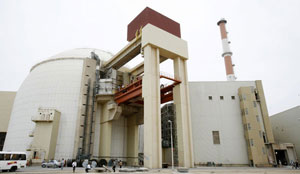(lead article)
U.S. gov’t leads push
for new Iran sanctions

|
|
Reuters/Raheb Homavandi (Iran)
|
|
Nuclear power plant in Bushehr, Iran, April 2007. Washington and allies seek to prevent Iran from developing capacity to enrich uranium, which Tehran says is needed for electrification.
|
BY CINDY JAQUITH
Seeking to put the Iranian government under maximum pressure as talks on its nuclear program open October 1, Washington, Paris, and London threatened further sanctions if Tehran does not comply with UN demands.
U.S. president Barack Obama, flanked by French president Nicolas Sarkozy and British prime minister Gordon Brown, announced September 25 the existence of another, previously unpublicized nuclear plant in Iran, charging this proved the Iranians are planning to produce nuclear weapons, an accusation Tehran denies.
The Iranian government had notified the UN International Atomic Energy Agency (IAEA) September 21 of the plant’s existence. Washington had known about the facility for at least two years, according to Defense Secretary Robert Gates.
According to the Iranian government, the plant is being built to enrich uranium up to 5 percent, which can be used as nuclear fuel—90 percent enrichment is necessary for use in a nuclear weapon. Washington and the other imperialist powers have rejected Tehran’s right to conduct uranium enrichment of any kind.
‘Line in the sand’
Obama called the Iranian decision to build the plant “a direct challenge to the basic compact at the center of the nonproliferation regime. These rules are clear: All nations have the right to peaceful nuclear energy; those nations with nuclear weapons must move toward disarmament; those nations without nuclear weapons must forsake them.” Washington, with thousands of nuclear warheads, remains the only country in the world to have dropped the atomic bomb on human beings.
Brown said, “The international community has no choice today but to draw a line in the sand.” Sarkozy called for more sanctions against Iran by December if “there is not an in-depth change by the Iranian leaders.” Obama noted that German chancellor Angela Merkel had expressed her agreement with their stance.
The day before, Obama had chaired a special “summit meeting” of the UN Security Council, which adopted Resolution 1887. Ostensibly about securing world nuclear disarmament, the resolution’s main purpose is to provide further ways to block the nuclear programs of both Iran and North Korea.
The Security Council—whose five permanent members are Washington, Paris, London, Beijing, and Moscow—has imposed three rounds of sanctions against Iran over the nuclear issue. Berlin will join the five in the October 1 negotiations with Iran.
Obama and Russian president Dimitry Medvedev met in New York during the UN sessions and held a joint news conference afterward. “We spent the bulk of our time talking about Iran,” Obama told the media. Medvedev, in a shift from earlier hesitations, made favorable comments on sanctions against Iran, saying, “in some cases sanctions are inevitable.”
While Moscow has criticized some of Washington’s anti-Iran measures, it has taken its own steps to limit Tehran’s nuclear capabilities. “Moscow has so far refused to deliver on two contracts: fuel for Iran’s first nuclear-power plant in Bushehr and advanced S-300 air-defense missiles,” said a September 28 article in the Wall Street Journal.
Beijing has maintained an official position of opposition to more sanctions against Iran. But that could change. In June Beijing supported financial and trade sanctions against North Korea over its nuclear program.
Ahmadinejad downplays threat
In a September 25 interview on CNN’s “Larry King Live,” Iranian president Mahmoud Ahmadinejad attacked the British and French governments as “still in the colonial age.” He said, “It does not matter to us [what they say], but what Mr. Obama says does matter.” Ahmadinejad said Obama’s attack on Iran was based on him receiving “wrong information.”
The Iranian president also downplayed the significance of Washington’s decision to suspend construction of antimissile systems in Poland and the Czech Republic, which led to Moscow’s warming up to anti-Iran sanctions. Ahmadinejad told AP the U.S. move was merely “a respectful way of buying out.”
On September 28 Iranian military authorities announced the successful test launching of the Shabab-3 and Sejil medium-range missiles. The Shabab-3 has a range 800-1,200 miles, sufficient to reach Israel, U.S. military targets in the Middle East, and parts of southeastern Europe.
U.S. defense secretary Gates said on ABC’s “State of the Union” talk show September 27 that stiff sanctions against Iran were preferable to a military strike against its nuclear facilities at this time.
“There is no military option that does anything more than buy time,” he said, “The estimates are one to three years.” Far better, he suggested, “for the Iranian government to decide that their security is diminished by having those weapons.”
Gates said sanctions against the Iranian purchase of equipment and technology for its oil and gas industries could be effective. He noted that “there are some fairly deep fissures in Iranian society and politics, and probably even in the leadership… . We know that the sanctions that have already been placed on the country have had an impact. The unemployment among youth is 40 percent. They have some real serious problems, especially with the younger people.”
In Israel, Prime Minister Benjamin Netanyahu called for “crippling sanctions.” Foreign Minister Avigdor Lieberman said it was time to “overthrow the mad regime in Tehran.”
Related articles:
No to sanctions against Iran
| 


